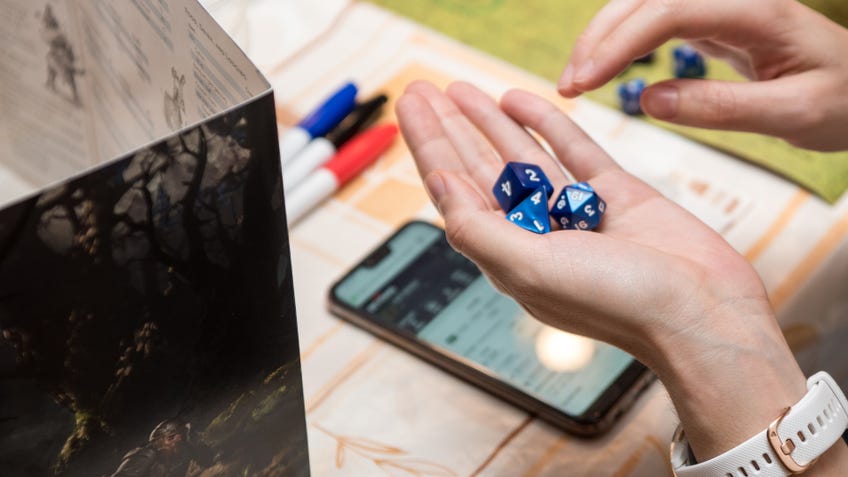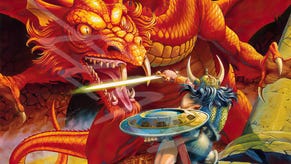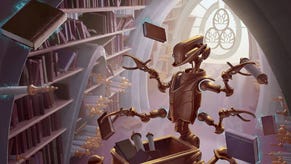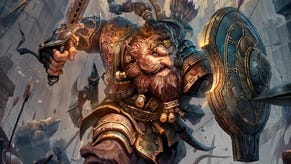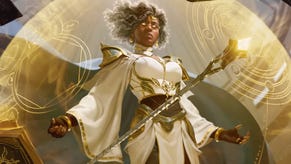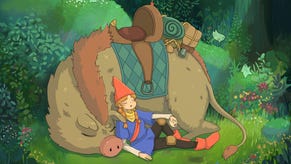10 essential DM tips for Dungeons & Dragons beginners
Get things rolling.
Taking on the mantle of dungeon master can be highly intimidating for D&D beginners and first-time roleplayers. Creating a world, filling it with interesting characters and providing an engaging story for your players that reacts to their decisions - not to mention remembering the various rules required - is a lot to take on if you’re new to the hobby.
But learning to DM, GM or whatever two-letter acronym your tabletop RPG of choice throws at you doesn’t need to be quite so daunting. There are some top DM tips that can make your life easier, as well as ultimately providing a better experience for both you and your players, letting you tell the stories you want to.
Top DM tips for D&D beginners
- You don’t have to know every rule
- Keep a bird’s-eye view of the game (and don’t plan too much)
- Things aren’t written in stone
- Your players can create the world with you
- The players aren’t your enemies
- You don’t always have to tell a complex story
- The rules are only a guide
- Give the players what they want as much as you can
- You don’t need to be a voice actor to portray compelling characters
- Safety and having a good time is more important than anything else
Whether you’re planning to run a roleplaying game for the first time, or you’ve been playing for years and are just looking to level up your skills, we’re gathered together 10 bits of essential DM advice to keep in mind next time your group gets together.
1. You don’t have to know every rule
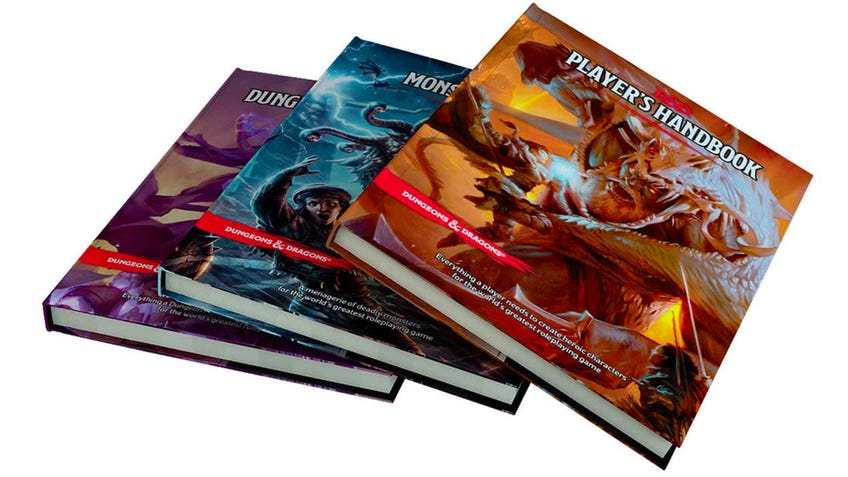
Whether you’re playing your first-ever RPG and pretty much everything is new to you, or you’re an experienced GM trying out a new system, at some point you are going to have to learn the rules of a game.
Let’s not bury the lede here: learning rules can be confusing and a pain in the arse. You might get lucky with a rules-light system but some of the most popular games out there require you to understand a lot of complex systems, dice-rolling mechanics and probabilities, and all sorts of other nonsense.
This can be especially tricky if you’re still wrapping your head around roleplaying in general as a new player. Case in point, many of you will be reading this because you’re looking for advice on how to play D&D. Despite its place as a common RPG starting point, D&D is not actually a particularly good game for beginners. It’s pretty dense and there’s a lot of information to grasp when you’re getting started.
You shouldn’t feel bad about sitting down to GM and not having a full grasp on every rule in the book. If you’re confused about how something works in play, don’t panic. You can improvise what happens in the moment and check on the rule later, or even pause the game briefly to give your players a break whilst you read the rulebook. Whatever you need, just do it. No-one is going to be upset that you don’t have an encyclopedic knowledge of how the game works on day one. (If they do, they probably suck - maybe don’t play with them.)
Here’s a subtip for free as well: your players can read the rulebook as well. RPGs aren’t a 30-minute board game you play once and move on from; you can spend your entire lives playing some campaigns. The more of your group that read and understand the rules, the easier it’s going to be to have a good time and crack on with the roleplay.
2. Keep a bird’s-eye view of the game (and don’t plan too much)

One of the biggest mistakes a lot of new GMs make is spending an entire week obsessively planning out a whole city’s worth of NPCs and encounters and lore and maps and- oh god, the paper, there is so much paper everywhere.
Take a breath. There’s something you need to understand about roleplaying: nothing ever goes to plan. So much so that the one-in-a-million time where everything does go exactly as you expected it to, you’ll be so taken aback that you’ll forget what your plan even was.
More and more RPG books nowadays are filled with endless randomisation tables. Character names, random encounters, loot, enemies, towns, weather… Everything is available to you at the roll of a die and the reason isn’t just for preparation. These things are designed to be used on the fly! In the moment! During the game!
The fact of the matter is your players will decide what actually happens in each session. The job of a GM isn’t to control the story but to guide it and react to it. You facilitate the adventure that your players are having. When you overplan your sessions you build these dependencies into the narrative that your players need to interact with to make it work. This can lead to a lot of GM frustration. “Argh, why aren’t they talking to this character? I spent a whole hour practising their voice lines and writing a complicated backstory!”
Don’t worry. Here’s a secret: until it physically happens in roleplay, nothing is canon. Is your super-serious NPC who guards the secret to the plot ignored after a single story but some random shopkeeper is getting whole hours of screen time? Why can’t that shopkeeper be an important character in the story? The players clearly love her, so let her be a part of the tale. Grab the bits that got forgotten elsewhere and work them into what’s currently happening. Did your players go through the wrong door yet again? No they didn’t. Until you open that door, its contents don’t exist.
Avoid the frustration on both ends and cut some corners. Or even better, simply don’t write those corners until you need to. By keeping a really zoomed-out, bird’s-eye view of the story you’re trying to tell you can fill in the details as and when you need.
Having a plan is great - and knowing the kind of narrative you and your players are all trying to tell from the offset is a genuine godsend - but the more rigid that narrative becomes, the less fun you’re likely to have telling it.
This hobby is all about being imaginative and rolling with the punches, so have fun with it! Tell stories even you didn’t expect to happen. Why do you think we roll dice every time we try something?
3. Things aren’t written in stone
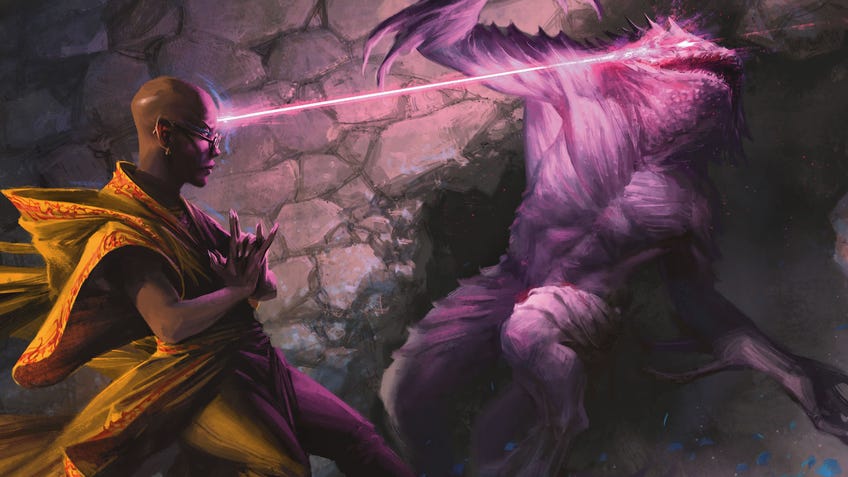
This is a sort of continuation of the last point, but this isn’t about planning. Instead, it’s about letting go and being comfortable with that.
A really bad habit that it’s easy to get into when trying to bend the story around your players’ actions is that as GMs we can sometimes write ourselves into a corner. There are a lot of plates you have to keep spinning to keep interesting stories ticking on the fly - and sometimes even the GM can end up unsure of where to go with things. There have been multiple times where a player of mine has asked about a certain NPC or plot hook to which my only response has been: “I’m sorry, I have absolutely no idea what you’re talking about.”
Here’s a key bit of advice that deserves to be talked about more: just retcon things. If something that’s been established before no longer makes sense - or if your players aren’t comfortable with where something is going - you can just pretend it didn’t happen.
There’s this weird phenomenon we all tend to have with RPGs where anything in the future is seen as limitless and unrestrained. Anything could happen! We aren’t tethered to the planes of reality; the story is ours and ours alone. But as soon as something does happen it becomes this unshakeable and immovable constant. We must not touch the past.
That doesn’t have to be true. It’s important to not mess too much with the past or your actions in the present might as well be worthless - but if some side character you all hate is too important to let go of? If your character did something last session that makes absolutely no sense in the story? If you just made a mistake? Get rid of it! Forget it ever happened! Change it forever! Why not? Actions should have consequences, sure. But in no other medium are you expected to tell a perfect story without a single edit. Allow yourself the privilege of tidying up.
4. Your players can create the world with you
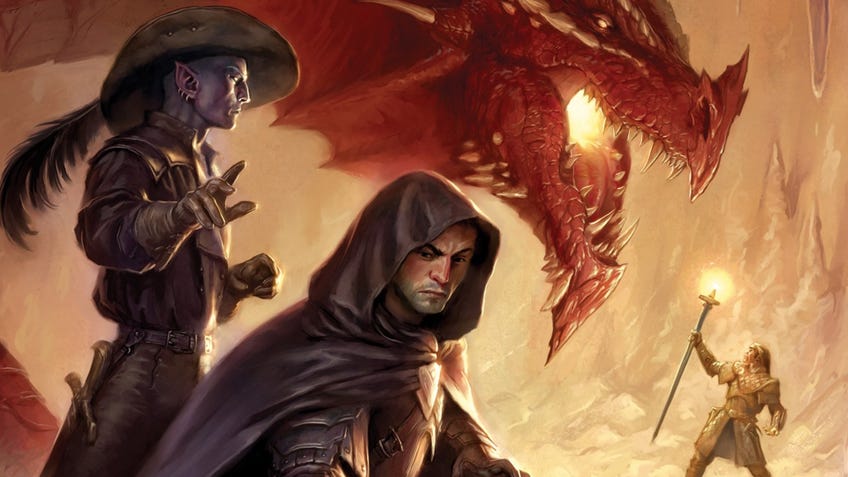
This is a simple one. You as the GM of the game do not have to be completely in charge of everything that happens in the world. RPGs are, for the most part, designed to be played as a group. And sometimes the rest of that group should be given the reins from time to time.
One of your strongest tools in the RPG toolbox is literally just asking your players questions. What do you find? How do they respond? What does it feel like? They can be little flourishes of player control or massive plot-defining moments handed over with love and trust to the player who it means the most to.
This isn’t unprecedented, by the way. You’ll often see things like this in modern RPGs. In Blades in the Dark, your players create the quests and some of the NPCs - they invent the magical items, choose their adversaries and define the stakes at hand. It’s a pretty common thing for D&D dungeon masters to ask the player to describe what happens when they critically hit an enemy, giving them a cool flourish after a big chunk of damage.
You don’t have to cordon off specific areas where the players are allowed to take control - give them the power whenever it seems interesting or appropriate. You’ll be surprised by how much it can elevate the story you’re all telling together and it’s a great way of getting your players more invested as they’ll feel more agency over the direction of the game.
5. The players aren’t your enemies
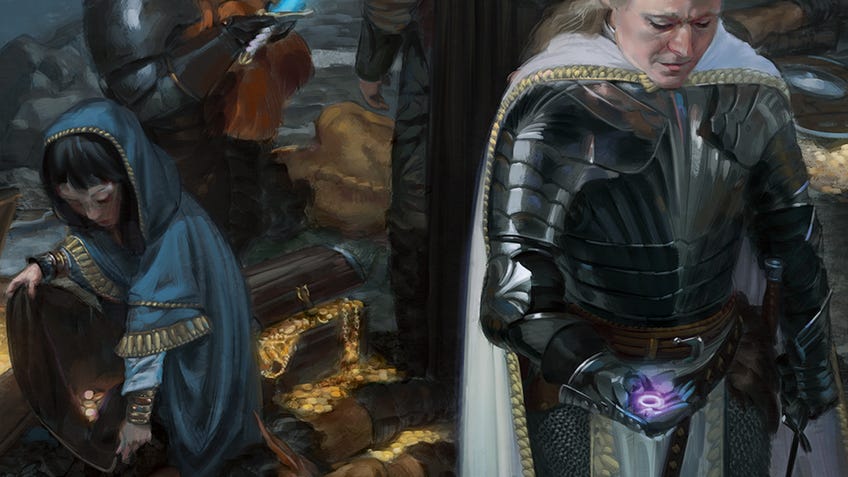
This is something often assumed to be common knowledge but it bears repeating. Roleplaying isn’t a competitive experience. Stories only build themselves when you work together, and that includes the GM. If you’re building your experiences in an effort to ‘beat’ the player you’re more likely to just frustrate or annoy them.
If players are asking genuine questions that are going to help them have a good time and you’re being secretive with them to stop them getting the upper hand, or if you’re unflinching in your sticking to the rules to the detriment of your group, you’re not gonna be telling a good story.
There are RPGs that are built like that, absolutely. Those can be fun to play, and some players do want a tough-as-nails challenge. For the most part, though, people are playing RPGs so that they can tell cool or interesting stories with their friends. If you’re going out of your way to disrupt that in an effort to ‘win’, that just sucks.
6. You don’t always have to tell a complex story
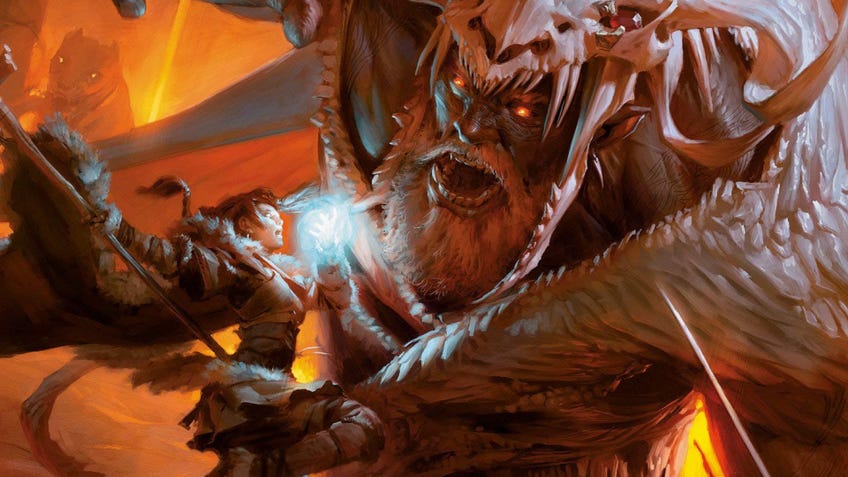
It can be fantastic to shock and excite your players with twisting and weaving narratives. To have grand scale and epic implications for every adventure. But maybe not every adventure.
Especially when you’re just starting out as a GM, it can be intimidating to tell a really mind-blowing tale that your players will be in awe of. But not every story is mind-blowing. Not every episode of your favourite TV show has groundbreaking moments and genre-defining plot devices in it. Sometimes they’re just fun romps or quiet moments with friends. Sometimes they’re straightforward narratives without too many twists. Sometimes the thing you expect to happen happens and it’s fun anyway. The same can be true of your adventures. Sometimes it is just a cave full of goblins. Sometimes the prime suspect did commit the murder. Try not to pressure yourself into being an Emmy-winning TV writer when you’re just having a good time with your friends over some dice and character sheets. It’ll only make the times you do really shake things up even sweeter.
It’s worth noting that your players will sometimes be new to this as well. Lead them in gently with a tale they can grasp nice and easily, and it’ll give them some room to get used to roleplaying or the system you’ve decided to play. Once everyone is comfortable you can start to subvert their expectations here and there, gradually building to those ambitious narratives. Remember: you can’t subvert expectations if those expectations aren’t there to begin with.
7. The rules are only a guide
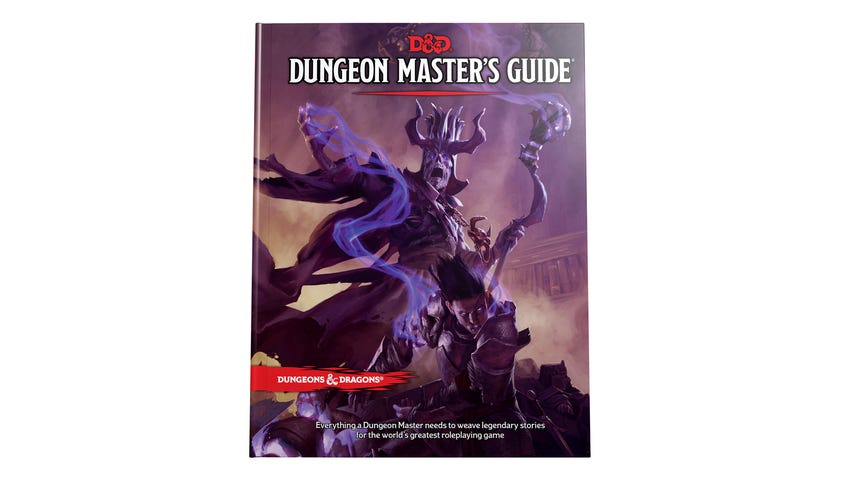
For those of you who are fully into the homebrewing and hacking side of RPGs this is likely already a code you live your life by, but if you’re new to the world of roleplaying here’s an important lesson for you to learn. The rulebook is a fantastic resource for facilitating your roleplaying sessions. It’s full of cool systems and amazing lore and if it’s well-written it will gently guide you through learning the game and getting comfortable with its mechanics and world. But it’s just a guide - and a fallible one at that.
The designers of your favourite RPGs aren’t equipped to deal with every single exception and foible that might come up in your play session. Sometimes play will be limited if you stick rigorously to the rules. Part of being a good GM is knowing when to bend or break those rules in service of the story. Did an absolutely epic moment just get ruined by a whiffed roll? It’s up to you whether you accept the results of that roll or ignore it and carry on with what everyone planned or wanted. Is the monster a little too strong or weak for your current party to tussle with? Tweak their stats. Is a rule in the book making someone uncomfortable during play? Ignore it. If a game you love has one aspect that you absolutely hate then just get rid of it.
The incredible power of tabletop roleplaying is that you are truly limitless in the things you can do. If there’s something you’re trying to work with that doesn’t fit inside the limits of the game’s rules then that shouldn’t necessarily stop you. The rules are a guide, but you and your players are ultimately in charge.
The high level skill of GMs is then knowing when to fluff those rules and when to let the game shine through. It can be tempting to abuse your power as GM but it’s sometimes best saved for the times when you really need it. The game you’re playing might be limited in its scope but it’s also the game you all decided to sit down and play. Sometimes you have to trust the designer has made the right design decisions and will guide you to something cool if you use the rules they’ve laid out. If you completely ignore the rules then you’ll end up playing the same game every time without realising. It’s about balance at the end of the day - and when you find the sweet spot you’ll be a far more accomplished and confident GM.
8. Give the players what they want as much as you can
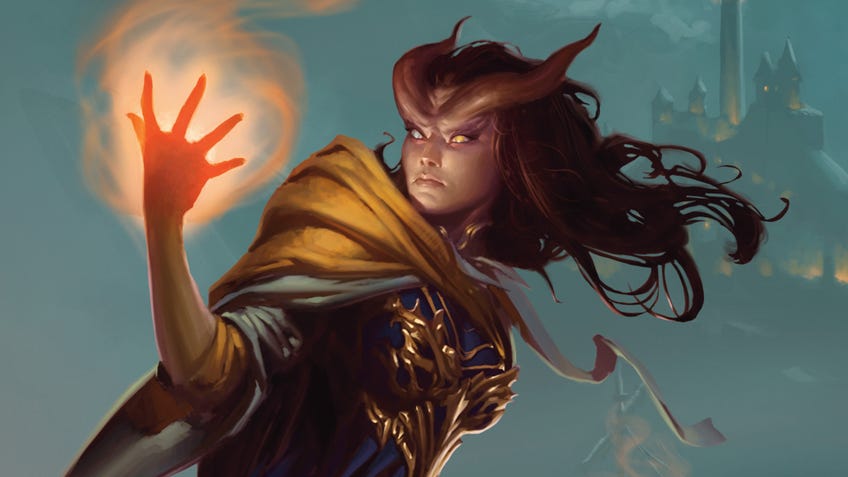
Sometimes it’s not just about letting the players have agency and letting them make decisions in the world you’re building. Sometimes you need to listen to what they’re aiming for and help them reach that point on their own. If you find yourself getting annoyed at your players for always going off and doing something different, you might not be telling the kind of stories you’re interested in.
There are a few ways to tackle this but the absolute best one is to just pay attention and listen to what they’re seeking. If your player spent ages writing a backstory about their character’s long-lost sibling they’re likely to be a little miffed if it never gets brought up.
It’s easy to assume that the GM is the only one who gets derailed by the players’ actions, but actually it’s far more commonplace for the players to feel like they’re being dragged away from their favourite moments to check back in on the plot they were avoiding. By observing the things they gravitate towards you can just fill your stories with more things like that. They’ll think you’re a genius - when in actuality you’re just being a good listener, and there’s no better skill when it comes to being a GM.
Struggling to work out what it is your players are looking for? Just ask them! Heart: The City Beneath has players select from a list of goals for their player to try and reach at the start of their sessions. By looking at those goals you can easily see what they want to achieve around the table today. If your game doesn’t have something similar then just talk to them about where they’d like to take their character, the sort of adventures they like going on or something they wished they’d been able to do in previous games. You can have these discussions in private if you’re worried about spoilers or you can sit around the table with your group to hash it out before each game.
We’re all working together when we play RPGs, so be a good team player and listen out to what your teammates are asking for.
9. You don’t need to be a voice actor to portray compelling characters
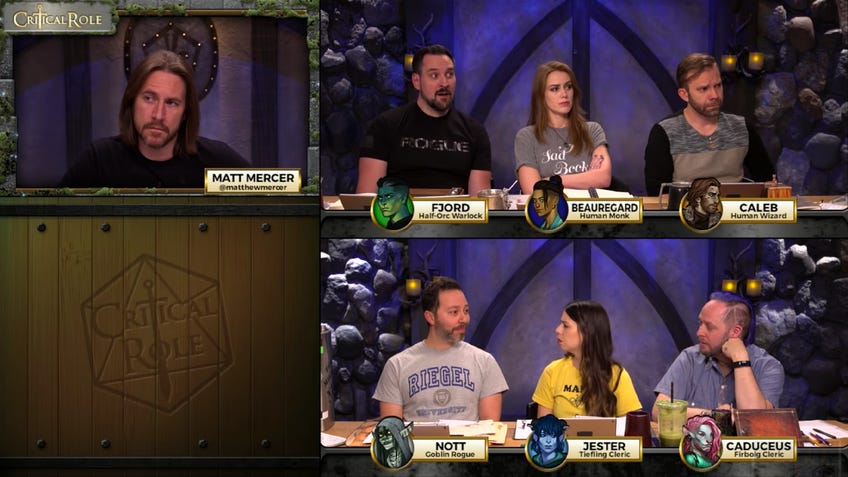
Here’s a little reassurance for those of you who get nervous about character acting. As a GM you have a lot of weight on your shoulders when it comes to performance. You’re playing literally everyone else in the world - and with that comes a demand for a lot of versatility.
A common fear among beginner GMs, and sometimes those who have been playing for years and years, is that they can’t “do accents”. And most people can’t! The thing is: it’s not the accents of your characters that makes them unique from each other. Mannerisms, quirks, turns of phrase, mistakes, jokes - these are the things that people remember about your characters and they’re the things you should be introducing to create interesting and diverse NPCs.
Defining a character just by the way they say things is always one-dimensional and after a while your characters will just blend into one even if they all sound different. By working in a unique way that people talk about things you can add intrigue and hints to who they are as a person. Maybe they don’t ever refer to another NPC by their name but just a very pronounced THEM. Maybe they spit after every sentence. Maybe they have a very slow and cautious inflection or a rapid one. You can make characters so much more interesting by thinking about what characteristics help them stand out rather than just worrying about what they sound like.
Also, remember you’re as much a narrator as you are an actor. You don’t have to perform everything you say. Your bounty hunter can have a thick Eastern-European accent without you actually doing it yourself - just say they do. In general, mimicking other people’s accents, especially outside your own country or continent, can be a bit inconsiderate. But that doesn’t mean you should never have characters from those parts of the world exist in your story.
10. Safety and having a good time is more important than anything else
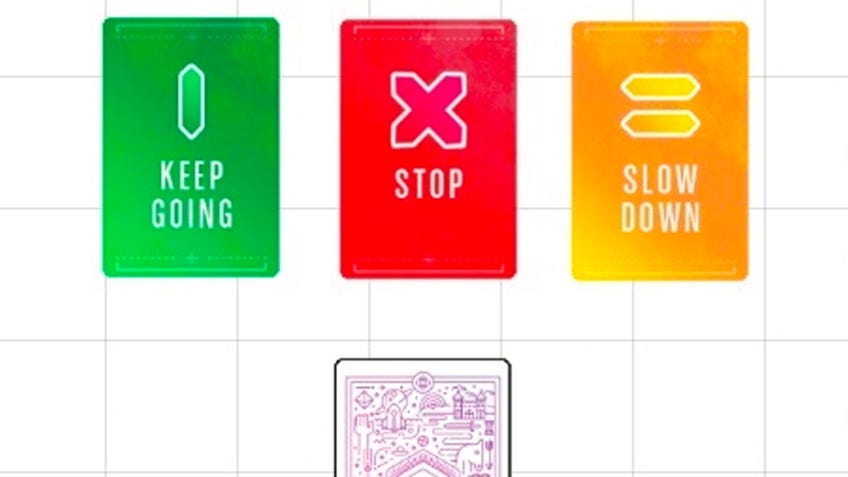
Finally the most important DM tip of all. The safety of your group will always trump any cool idea or fun mechanic you want to use in your setting or story. We can never truly know what other people around the table are feeling or have experienced in their lives. There are some topics or tones that your players just won’t want to experience. It could be as obvious as something like violence or bigotry, or more personal like certain players not wanting to delve into things such as motherhood or alcohol or loud noise.
There’s no topic that can’t be removed from your story when necessary; nothing is too integral to warrant putting someone else in an uncomfortable situation. There is now a huge range of safety tools to help groups of players navigate these situations with tact and respect for the other people in their group. Many games will even suggest ones that work well with their systems.
You’ll be far more comfortable after knowing where you and your players’ hard lines sit, and your players will be more confident in your ability to handle things with the respect they deserve.
These things change as well - something that might not have been an issue for you in the last session could now be a hugely traumatic thing to experience in play and your guidelines around those topics will need to be clearly translated and fluid.
